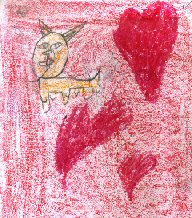|
|
|
|
||||||||
For Educators
Educational Activity | Other Ideas | For Older Kids | Links
Humane Education is the term for any curriculum that teaches
students to care for the animals in their homes and communities. The
goal of humane education is to create a culture of empathy and caring by
stimulating students' moral development and sense of responsibility.

Humane education introduces children to the emotions of animals and
links this knowledge to a wider understanding of environmental issues and
ecosystems. It is about fostering kindness, respect and empathy for both
human and nonhuman animals.
Humane education teaches people how to accept and fulfill their responsibility to companion animals. It teaches people to understand the consequences of irresponsible behavior and finally, humane education encourages the value of all living things.
Visit our
page with downloads/ideas for educating the community at large.
You could use the following humane education activities in association
with:
National Dog Week (fourth week of September)
Valentines Day (February 14, with a message of "love your dog")
Earth Day and Earth Week (third week in April)
Be Kind to Animals Week (first week in May)
National Dog Bite Prevention Week (third week in May)
Educational Activities (for younger students)
(NOTE: You will need Adobe Acrobat Reader to view the PDF files on this page. You can download this software free.)
Students will compare the life of a chained dog to that of a happy family pet:
- Share these six pages of color photos with the students.
- Ask the students these questions about each of the photos. The students will use analytical thinking when examining the photographs and answering the questions, which will lead them to a better understanding of what life is like for a chained and neglected dog.
Students will write an ending to this
two-page story
by Debra White. The story is about a cat, Harriet, who moves to a new
house and is surprised to find a dog, Joey, chained in the yard next door.
Can Harriet help free Joey?
This would be a great activity to use in an Essay Contest.
Dogs Deserve Better has a great coloring book and Puddles on the Floor storybook/teacher kit.
| [top] |
Other Ideas
- Use some of the information on this website, including the Chained Dog's Poem or Donovan's Story, to educate students about chaining. Ask students to complete a creative writing exercise about life for a captive animal (chained dog, zoo animal, factory farm animals, circus animals). Students can write a "first person" account of what it would be like to live that animal's life and to see through that animal's eyes.
- Have students investigate an animal rights/welfare issue and write facts and their opinion about it.
| [top] |
For Older Students
American Humane Association has some excellent humane education ideas.
Teach Kind has
some great activities and free materials for students of all ages. Get a
free classroom subscription to
Grrr! Magazine, which features animal-friendly musicians, actors, and
athletes; inspiring stories of young people who are helping animals; and
simple things that students can do to help animals in their own
communities
The book Nobody's Pets
by Debra White is a moving chapter book about some adventuresome shelter
animals. It is a also a story about friendship, hope and determination. If
you mention this site when you order, UnchainYourDog.org will receive a
portion of the proceeds.
Students can visit the Humane Teen website to learn more about animal welfare issues and find out what other teenagers are doing to help animals.
The Dumb Friends League of Denver, Colorado has a list of downloadable lesson plans for older students that can be tailored to your own community.
| [top] |
Humane Education Links
American Humane Association
offers excellent Be Kind to Animals and
Be Kind to Animals...and People, Too! units for K-12 students. All
materials are available for download, including a Humane Education Pledge Form.
The curriculum is easy for first-time humane educators to use. Please take
advantage of these great ideas!
ASPCA's www.animaland.org
is a fun page for children.
PETAKids is a website
for children, where kids can subscribe for the free magazine GRRR! - a
cool, colorful magazine with lots of celeb interviews. You can also download
back issues.
ASPCA-Kids is a fun kids' site.
The ASPCA's
Animal Lessons page has worksheets and PDF newsletters.
National Association for Humane and Environmental Education offers a Humane Teen website and publishes a wonderful, award-winning newsletter called Kind News. For just $30.00 a year a classroom will receive 32 issues each month and a Teachers Guide. Sponsor a classroom today!
Teach Kind offers lesson plans and videos on many animal welfare issues.
Janie's Coloring Hats is a fun activity where kids color black and white
animal drawings that are then made into hats.
British Columbia Society for the
Prevention of Cruelty to Animals offers units on bite prevention, "kindness
counts" and empathy, rabbits and guinea pigs.
Canadian Federation of Humane Societies offers PDF back issues of their humane education newspaper for children.
The National Humane Education Society will mail you a humane education packet including lesson plans, a Teacher's Guide, tips on connecting with schools, and interactive ways to present humane ed. They will also visit classrooms free in New York, DC, and California. NHES also has a For Kids site with activities, games, scout badge info, and more.
Dumb Friends League of Denver, Colorado has a wide range of lesson plans for all ages.
The Latham Foundation
offers humane education publications and videos.
The International Institute for
Humane Education offers a distance learning master's degree in Humane
Education, along with a Humane Education Certification Program.

